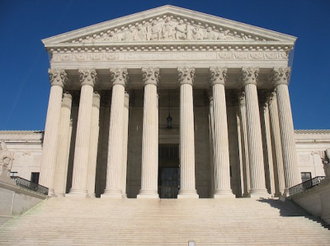Church leaders respond to Supreme Court overturning Roe v Wade

Source: USCCB/Vatican Media
On Friday, 24 June, the US Supreme Court handed down its 6-3 ruling overturning a Mississippi abortion ban and 5-4 ruling ending the 49-year-old precedent Roe v Wade and, with it, the constitutional right to an abortion in the United States.
In response to the ruling in Dobbs v Jackson Women's Health Organization, Archbishop José H Gomez of Los Angeles, president of the US Conference of Catholic Bishops (USCCB) and Archbishop William E Lori of Baltimore, chairman of the USCCB's Committee on Pro-Life Activities issued the following statement:
"This is a historic day in the life of our country, one that stirs our thoughts, emotions and prayers. For nearly 50 years, America has enforced an unjust law that has permitted some to decide whether others can live or die; this policy has resulted in the deaths of tens of millions of preborn children, generations that were denied the right to even be born.
"America was founded on the truth that all men and women are created equal, with God-given rights to life, liberty, and the pursuit of happiness. This truth was grievously denied by the US Supreme Court's Roe v Wade ruling, which legalized and normalized the taking of innocent human life. We thank God today that the Court has now overturned this decision. We pray that our elected officials will now enact laws and policies that promote and protect the most vulnerable among us.
"Our first thoughts are with the little ones whose lives have been taken since 1973. We mourn their loss, and we entrust their souls to God, who loved them from before all ages and who will love them for all eternity. Our hearts are also with every woman and man who has suffered grievously from abortion; we pray for their healing, and we pledge our continued compassion and support. As a Church, we need to serve those who face difficult pregnancies and surround them with love.
"Today's decision is also the fruit of the prayers, sacrifices, and advocacy of countless ordinary Americans from every walk of life. Over these long years, millions of our fellow citizens have worked together peacefully to educate and persuade their neighbors about the injustice of abortion, to offer care and counselling to women, and to work for alternatives to abortion, including adoption, foster care, and public policies that truly support families. We share their joy today and we are grateful to them. Their work for the cause of life reflects all that is good in our democracy, and the pro-life movement deserves to be numbered among the great movements for social change and civil rights in our nation's history.
"Now is the time to begin the work of building a post-Roe America. It is a time for healing wounds and repairing social divisions; it is a time for reasoned reflection and civil dialogue, and for coming together to build a society and economy that supports marriages and families, and where every woman has the support and resources she needs to bring her child into this world in love.
"As religious leaders, we pledge ourselves to continue our service to God's great plan of love for the human person, and to work with our fellow citizens to fulfill America's promise to guarantee the right to life, liberty, and the pursuit of happiness for all people."
The Pontifical Academy for Life commented, saying the issue of abortion cannot remain "confined to the exercise of individual rights but instead is a matter of broad social significance."
"After 50 years, it is important to reopen a non-ideological debate on the place that the protection of life has in a civil society to ask ourselves what kind of coexistence and society we want to build."
The Pontifical Academy for Life said governments should enact policies that "favour life without falling into a priori ideological positions".
This includes "ensuring adequate sexual education, guaranteeing health care accessible to all and preparing legislative measures to protect the family and motherhood, overcoming existing inequalities."
"We need solid assistance to mothers, couples and the unborn child that involves the whole community, encouraging the possibility for mothers in difficulty to carry on with the pregnancy and to entrust the child to those who can guarantee the child's growth."
The President of the Pontifical Academy, Archbishop Vincenzo Paglia, said: "In the face of Western society that is losing its passion for life, this act is a powerful invitation to reflect together on the serious and urgent issue of human generativity and the conditions that make it possible; by choosing life, our responsibility for the future of humanity is at stake."

















